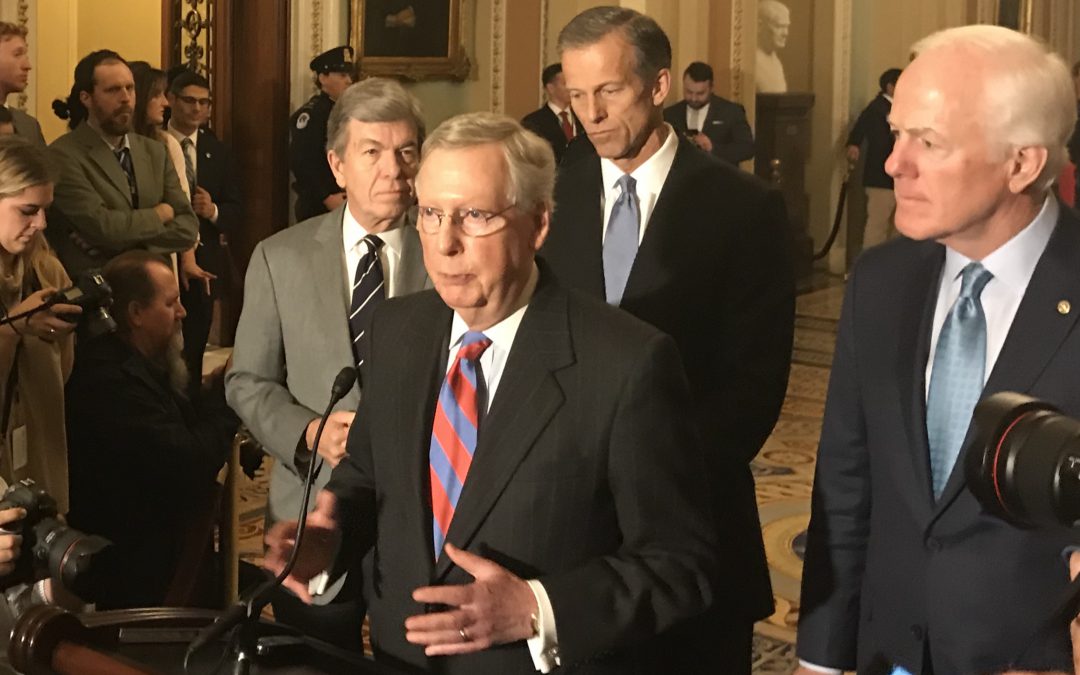UPDATE:
WASHINGTON– The House voted early Friday morning to approve a $500 billion, two-year budget deal forged by Senate Republicans and Democrats and end a brief government shutdown prompted by a delay in final congressional action.
House leaders had to overcome opposition from both liberals including Minority Leader Nancy Pelosi, D-Calif., and Tea Party conservatives to pass the massive spending measure and send it to the White House for President Donald Trump’s signature.The final vote was 240 to 186.
The budget deal was held up for final passage in the Senate last night in the face of a protest by Republican Sen. Rand Paul, R-Ky., who complained the deal would seriously add to the deficit. Shortly past midnight, the government technically ran out of money and a government shutdown was begun — the second one in a month.
The Senate finally broke the logjam before dawn, by a vote of 71-28, and sent the bill to the House for final passage.
The final deal will fund the government for the next two years, adding nearly $500 billion to the nation’s growing deficit. The deal, negotiated by Senate Majority Leader Mitch McConnell, R-Ky., and Minority Leader Chuck Schumer, D-N.Y., secures spending for the military, healthcare, disaster relief and education, among others.
The latest appropriations agreement is not only a bi-partisan surprise, but a departure from the prolonged use of stop-gap spending bills or continuing resolutions that have been used by Congress to temporarily fund the government.
The 652-page compromise plan received Democratic support even without an immigration deal to continue to protect nearly 700,000 young illegal immigrants from deportation under the Deferred Action for Childhood Arrivals (DACA) immigration program. Previous GOP inaction on the issue compelled Senate Democrats to shut down the government for three days in January.
On Thursday morning, House Speaker Paul Ryan, R-Wis., said there were enough Republican and Democratic votes in his chamber to pass the budget deal as it was. While passage in the Senate seemed a certainty before Paul’s one-man filibuser, the outcome was in doubt in the House because of opposition from both conservatives and liberals.
Members of the conservative Freedom Caucus were outraged that the deal will drive up the annual budget deficit to $1.1 trillion in fiscal 2019, while Minority Leader Pelosi refused to back the spending compromise without new DACA legislation to protect the young immigrants who were brought to this country by their parents.
Here are the key components of the what the deal entails:
The Military would receive a bulk of the funds, bringing in an additional $165 billion for the next two years for military spending and contracting. Another $140 billion would be added to an emergency war fund used to finance fighting in Iraq, Afghanistan and Syria.
Emergency Management would get an $89.3 billion boost in funding for communities still recovering from last year’s hurricanes. Another $4.9 billion would be spent to support Medicaid programs in Puerto Rico and the U.S. Virgin Islands.
For Healthcare, the Children’s Health Insurance Program (CHIP) would get a 10-year extension through 2028. Another $6 billion would be spent on addressing the opioid crisis, and $7 billion community health centers. $2 billion would be carved out for the National Institutes of Health (NIH) for medical and treatment research.
A total of $20 billion would be allotted for Infrastructure projects, $10 billion for 2018 and the another $10 for 2019. During his State of the Union address, President Donald Trump called for legislation that would generate $1.5 trillion for infrastructure funding. The proposed budget deal would provide infrastructure improvements for ground transportation projects and expanding broadband access to rural areas.
Support for Higher Education would include $4 billion for college affordability programs and increased graduation rates among students. The funding would also benefit teachers and law enforcement.
Federal Child Care programs would receive $5.8 billion over the next two years, including support for Child Care Development Block Grants, which provides subsidies for child care in low-income households.
No Immigration deal was included in the budget proposal. Nearly 700,000 recipients of the DACA program with two-year work permits expiring on March 5 would be vulnerable to deportation following that deadline. On Wednesday, Pelosi broke the record on for the longest House floor speech in congressional history while reading stories of beneficiaries of the program.
With no deal for DREAMers, Republicans averted a crisis by stalling action on the controversial issue in a tight midterm election year. But Democrats can still claim a win in the deal because mandatory spending caps on defense and domestic spending originally imposed by the 2011 Budget Control Act will be lifted by $26 billion each.
Under the budget agreement, the national Debt Ceiling would be waived through March 2019, allowing the Treasury to borrow money as needed to allow appropriations to continue.
The White House is set to submit its funding requests for next year’s fiscal 2019 budget request on Monday, but Congress is likely to have spending deals in place on Thursday night before another government shutdown kicks in.

